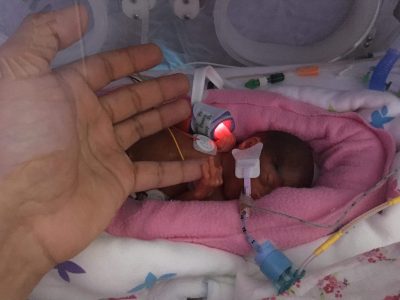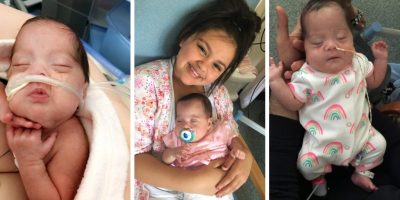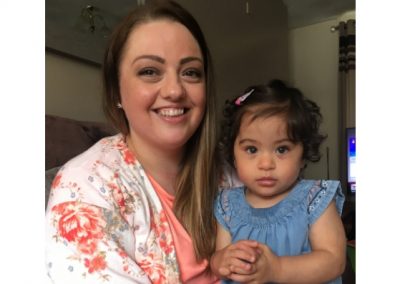Ayah’s story

Christie Malik was overjoyed when her and her partner, Wajahat, found out they were expecting. The couple had been trying for a baby since their second daughter, Aaliyah, was born stillborn at 27 weeks in 2013 and had started to think that it would never happen for them.
Their joy, understandably given their previous experience, was also mixed with worry. Christie tried her best to enjoy her pregnancy though and felt reassured that her regular checks and scans revealed a growing, healthy baby each time. At their 20 week scan, the couple couldn’t agree whether to find out the baby’s gender and in the end Wajahat chose to, under the strict condition that he wouldn’t tell Christie. As it turned out though, Christie didn’t have to wait long to find out for herself.
Christie says: “We were decorating the house when I first realised that I was bleeding. I was only 22 weeks and five days pregnant at that point and I knew full well that babies born that early do not survive. I tried not to panic and rang my midwife who told me to go straight to the hospital for an examination. I knew straight away from the medical team’s faces that things were bad but I didn’t realise how bad until they told me I was 4cm dilated. There was nothing they could do to stop the labour because I was too far gone.”
Christie and Wajahat were put in a room where a consultant told them what they already knew. A baby born this early had less than a 5% chance of survival and if it did survive, would suffer from severe and wide ranging disabilities. It was highly unlikely that the baby would even be born alive and would officially be classed as a miscarriage.

Christie says: “We were basically being told that there was no hope and at that point I was swaying wildly between blind panic and a feeling of total numbness. Losing Aaliyah had been devastating and I knew I just didn’t have the strength to go through it all again. But that was the situation we were in, with all that horror ahead of us.”
Christie was transferred to Swansea where for a while nothing much more happened. But on the evening of the second day, still at only 23 weeks and one day of pregnancy, her waters broke and within minutes, baby Ayah was born, weighing a tiny 1lbs 1oz.
Christie says: “We’d begged them in advance to at least try and help Ayah if she was born alive and they agreed as long as she was showing signs of life trying to breathe for herself. They took her to the corner of the room immediately and after what felt like an age, the doctor turned around and gave us the thumbs up. We saw her for only a few seconds before she was taken away and all I can honestly remember thinking was ‘how possibly can something that tiny survive.’ She would have fitted with room to spare in to the palm of my hand.”
“There was no honeymoon period that you often hear about after a premature baby is born. We went straight in to a grade three and four bleed on her brain which we were told were very potentially lethal. I couldn’t bring myself to leave her side for a minute, I wanted to savour every second I was going to have with her. But the whole time, I couldn’t get the image of burying her out of my head. I’d been through losing a baby before and I wouldn’t wish that pain on anyone but the emotional pain of having your baby alive in front of you but knowing that you could lose her literally at any second is a level of pain I can only describe as numbing.”
Over the next few days baby Ayah was hit with pretty much every complication possible and at the two week point Christie and Wajahat were again taken in to a room to discuss placing a shunt in Ayah’s head to relieve the pressure on her brain. They were also told that, should she survive the bleeds Ayah would probably be severely disabled.
Christie says: “At that point I started to wonder whether I was being selfish to want her to stay alive. I wondered whether she was in pain and whether she had the strength to endure it all. On the one hand I knew that whatever the outcome, if she lived, I would cope with anything because all I wanted was for her to be with us. But on the other hand I couldn’t bear the thought of her suffering.”
“I only ever left Ayah’s side to eat and sleep and I couldn’t even do either of those without constant anxiety. The nights away from her were the worst. we’d get a phone call in the middle of the night to say that something had changed and we needed to go in. I would completely freak out every time thinking this was it, that we were losing her. We were always on guard, always waiting for the next terrible thing to happen.”
Over the following weeks though, the bleed on Ayah’s brain did begin to resolve itself and although she continued to face many obstacles, like the struggle to withdraw her from the ventilator, Ayah got through every one. In June, she was well enough to be referred to the consultant ophthalmologist, Dr Patrick Watts, for an operation to correct the Retinopathy of Prematurity (ROP) which could have caused blindness in both her eyes. But after more rigorous examination, it was decided that the procedure would be postponed to see whether the condition would correct itself – and it did!
Over the weeks and months that followed, Ayah continued to grow in strength. Her mum and dad spent that time talking and singing to her, telling her how loved and amazing she was.
After 22 weeks and transfers to four different hospitals for various types of care and procedures, the miracle baby who was given less than a 5% chance of survival went home entirely able to breathe and eat by herself. Christie says she begged their consultant to let them go home with a sensor that would alarm if Ayah stopped breathing, but after a week they put it away.
Despite the fact that she had done so well, Christie and Wajahat did know that many of the problems that could emerge as a result of Ayah’s early birth could do so over time. One of the brain bleeds had left a cyst on Ayah’s brain which the medical team had warned may cause cerebral palsy so she was referred for an intensive course of physiotherapy the moment we left the hospital . Recently the physio team told Christie that they had all been in shock after seeing Ayah “Given her already extensive medical history, they’d been expecting a severely disabled child. What they got instead was our 5% miracle.”

“I owe my life to NICU care and the miracle workers who work within them. What greater achievement is there than to save someone’s life, especially one that was given little or no chance of survival. Having spent months in hospital watching other families whose outcomes weren’t as good as ours, I think about how lucky we are every day. I could have had a very different life, I’d prepared myself for a very different life, but Ayah showed me differently. She’s perfect.”
“Ayah was so small and helpless that her body couldn’t function independently at all without the machines that kept her alive which is part of the reason I’m supporting the Tiny Lives Appeal. The complications and medical challenges that these babies face are shocking, I’ve seen it with my own eyes and I still can’t believe it, so they need the best there is to get them through it.”
“Ayah’s means ‘amazing miracle’ in Arabic and her middle name, Aydah means ‘returning gift’ which I think sums her up perfectly. I’m not a religious person but I remember feeling very strongly that Aaliyah was watching over us during the most difficult times. I’d often speak to her and ask her to send us a rainbow if she was there and I can honestly say that I’ve never seen so many rainbows than I did during that time. I remember breaking down in the shower one evening just filled with this overwhelming feeling that I couldn’t cope with losing another baby like Aaliyah, and when I walked in to the bedroom after there was the biggest brightest rainbow outside our window.”
Now 21 months old, Ayah continues to beat the odds and is hitting all her developmental milestones right on time. Christie, Wajahat and Ayah’s adoring big sister Aisha dote on her and can’t wait to spend Christmas with her.
The gift of sight
Like many babies born prematurely, Ayah developed a condition called Retinopathy of Prematurity (ROP), a potentially blinding disease which is caused by the abnormal development of blood vessels in a baby’s eye. As part of its support of the Noah’s Ark Charity Tiny Lives Appeal, clothing and accessories company Primark recently donated £107,461 to fund a specialist imaging device which allows clinicians to identify and diagnose vision disorders in newborn babies. The PanoCam takes a complete and detailed image of both the surface and sub-surface of the eye helping to detect conditions like ROP and also Retinoblastoma (RB) which, if undetected, can be life-threatening.
Noah’s Ark Charity, director, Suzanne Mainwaring said: “Primark are long term supporters of the charity having partnered with us on the very initial stages of the children’s hospital’s build. In the last two years alone they have donated a total of £237,000 to the Tiny Lives Appeal, which is a massive contribution to the £1million target that we are so close now to achieving.”







